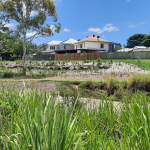Upcoming Events
Time : 5:30pm registration, 6pm start, 8pm finish
Queensland has recently introduced the single use plastic bag ban and is working towards a Container Recycling Scheme later this year. This has come about from the extensive research into the impact that plastics are having on our oceans. However, aside from the vision of turtles swimming in oceans of plastic bags and dead whales with plastic filling their gut, what is the science behind the news items? Is it as big an issue as the sensational headlines make out?
Come and hear from Professor Kevin Thomas (UQ Queensland Alliance for Environmental Health Sciences (QAEHS), about the latest advancements in microplastics measurement and management challenges. Then learn from Colin Hester (Queensland Urban Utilities) on the logistics of managing a waste stream with microplastics within it.
Light refreshments & finger food included
Awards Dinner Tickets
Members: $100.00 (inc. GST)
Non-Members: $155.00 (inc. GST)
For entry submissions see below;
Joint event between;
Stormwater Queensland & Engineers Australia, Queensland Division, Water Panel
Date: Thursday 6th September, 2018
Time: 1pm – 5pm (Registration opens 12.30pm)
Location: Hawken Auditorium, Engineering House
Flood Forecasting requires underlying systems and techniques that has applications within various parts of the water industry. While the Bureau of Meteorology is the official flood forecasting agency, they work in close co-operation with related agencies who manage emergency response and/or water resources. This requires systems that take in real-time data and provide robust and quality controlled data to decision makers. Flood forecasting systems are a rapidly advancing, highly innovative field solving unique problems.
This event will provide a range of presenters from the industry including:
- Seqwater (Lindsay Millard)
- Bureau of Meteorology (Sue Oates & Jonty Hall)
- Ipswich City Council (Adam Berry & Matthew Pinder)
- Water Technology (Alister Daly)
The event will highlight and showcase how some of the different forecasting systems across organisations are being used and their linkages. You will get to see firsthand how different authorities respond to actual flood events and how they work together in Qld – it is a peek into something quite unique and exciting. A range of different forecasting and meteorological products ranging from basic to complex will also be demonstrated within multiple flood forecasting systems.
BoM will provide a presentation on their new, current and future products. This presentation will include information on their HyFS [Delft-FEWS] system and a general overview on the development phase STEPS and Rainfields products and how these have been incorporated into a trial flash flood forecasting system at Ipswich City Council. Furthermore, an insight into how an Emergency Management Response team would utilise some of this data in an actual flood event will be provided
Seqwater will demonstrate the real-time data exchange between the modelling systems occurring between BoM’s HyFS and SeqFEWS [Delft-FEWS flood warning systems. The quality control of the rain and flow gauge datafeeds that inform the models will also be presented.
A method in which radar rainfall is utilised by flood modellers will also be showcased in an example of how to calibrate flood events using a radar rainfall calibration approach.
This promises to be an event full of new information, practice and innovation in an emerging and exciting space in floodplain management.
Event facilitated by Daniel Niven (Engineers Australia Water Panel and Stormwater Qld Committee Member)
Like all infrastructure, stormwater control measures (SCMs) and other Water Sensitive Urban Design (WSUD) assets require appropriate maintenance to ensure they are achieving their original purpose. It is subsequently recognised that the operation and maintenance of SCM and other WSUD assets require significant and appropriate resources to ensure their appropriate function. However, anecdotal and published information indicates that these assets are often not being appropriately maintained and are subsequently often not achieving their design objectives. ‘Stormwater utilities’ have been proposed as one solution to provide a stable funding source for stormwater management.
Our upcoming workshop will be a chance to describe and discuss the current status of SCM management in QLD (for both privately and publicly owned assets), and describe/ discuss the potential option for future ‘stormwater utilities’.
The format will include short presentations from an Expert Panel followed by an interactive discussion between the audience and panel. Come along, be involved and debate the many competing issues. A complex challenge that requires broad discussion to provide direction and lead our thinking on this critical topic – don’t miss your chance to contribute in this important area.
Confirmed Expert Panel Members include:
- Jonathon Whitcombe (Moreton Bay Regional Council)
- Andy Hornbuckle (SPEL Environmental)
- Charles Coathup (Renew Solutions)
- Stephen Turfrey (Redlands Shire Council)
Cost:
- Members and students: $65/ person (incl. GST)
- Non-members: $100/ person (incl. GST)
Stormwater Qld is facilitating an opportunity for The Department of Environment and Science to provide a summary of the:
As these guidelines have not been endorsed by Stormwater Queensland we are facilitating this event as a way to allow our members and others to provide feedback to the state on both guidelines. We believe that strategic overview and direction of important issues require feedback to help improvements in this space. Because of this, SQ is providing this event free of charge as we really need our industry to voice their opinions and share their knowledge. Date: Wed 6 March 3:30-5pm Where: Department of Environment and Science 400 George Street Brisbane Qld 4000 No catering provided |
After five years of consultation, collaboration and negotiation, Stormwater Australia released the SQIDEP document in December 2018. The document provides a uniform set of criteria to which all stormwater treatment measures (green & grey) can be field-tested and reported. These criteria should guide and inform field monitoring programs that seek to demonstrate pollutant removals for treatment measures implemented to achieve planning water quality objectives.
This SQ event will be facilitated by Sally Boer, Director, E2Designlab, and include an expanded list of speakers. Alan Hoban, Director, Bligh Tanner, will present on the consultation process and development of the SQIDEP and future. This will be followed by a presentation from Darren Drapper, Principal, Drapper Environmental Consultants, on the SQIDEP technical content and practical implementation. Following these two presentations a panel of speakers will each provide a short summary of their thoughts on the SQIDEP. The panel will comprise: Andy Hornbuckle, SPEL Environmental; Mike Wicks, Stormwater360; Charles Kelly, Humes; Stephen Baker, Rocla; and Andew Macklin, Urban Asset Solutions. Following the panel discussion, you’ll have an opportunity to ask your questions about this important industry benchmark.
Don’t miss this chance to be at the leading edge of this significant step-change in our industry. Following the workshop, there will be an opportunity for networking and further informal discussions over drinks and canapés with industry colleagues.
If you are not currently a Stormwater Queensland member, apply to join today and attend this event at the dicounted member rates. Apply here
Topic: How stormwater can deliver cooler greener cities
Presenters: Kim Markwell – Associate Environmental Scientist of E2Designlab, Chris Tanner – Regional Manager of the CRC for Water Sensitive Cities & Luke McPhail – Integrated Water Management Specialist of Water Technology.
Date: Thursday 11 June 2020
Time: 1.00pm – 1.45pm
Presentation Summary: A growing body of research is demonstrating the linkages between human health and wellbeing and creating cooler urban environments by retaining water in the landscape. This is where stormwater can play a major role in designing liveable cities.
In this webinar Kim Markwell (from E2Designlab) will investigate the drivers to consider urban cooling and demonstrate the multiple benefits which can be achieved through adopting principals of water sensitive cities. Kim will also introduce “Designing for a cool city: Guidelines for passively irrigated landscape”, the newly released national guidelines which looks at considerations for design, construction and maintenance of these systems.
Chris Tanner (from the CRC for water Sensitive Cities) will use a current case study at Norman Ck, Brisbane to showcase the use of CRCWSC tools for economic frameworks, infill development typologies, urban heat and water cycle investigations using a timeline of “Now, New and Next”.
Luke McPhail (from Watertech) will present a demonstration of the newly released Scenario Tool which brings together a range of data sets including climate, demographics and landform in an online GIS platform. Various planning scenarios can be assessed through metrics including Water Balance, Land Surface Temperature and Thermal Comfort.
Registration: This webinar is FREE of charge to all. Follow the link below to register:
Topic: Challenges in transitioning to Sustainable Stormwater Practices: Insights from the Investigation of Stormwater Control Measures Maintenance in Melbourne
Presenters: Andrew Thomas – Vice President, Stormwater NSW
Date: Thursday 25 June 2020
Time: 1.00pm – 2:00pm
Presentation Summary: The expansion of urban development across the globe has brought with it significant environmental impacts. Prominent amongst these impacts is the degradation of marine and freshwater environments caused by conventional approaches to stormwater management infrastructure that facilitate the rapid conveyance of untreated stormwater to waterways. Stormwater control measures (SCMs) are a sustainability innovation developed to redress these environmental impacts. However, there are growing concerns that SCMs are not receiving sufficient maintenance and that, consequently, their long-term performance may be compromised.
This study sought to gauge the veracity of these concerns and ascertain the barriers and challenges to the maintenance of SCMs. Nine local councils in Melbourne, Australia were engaged to provide condition data for their SCMs and access to their professional staff to collect perspectives on the barriers and challenges to SCM maintenance. 55 inter-dependent barriers and challenges were identified across nine sociotechnical categories, confirming SCM maintenance as a complex multi-causal sociotechnical problem, and one potentially symptomatic of a loss of momentum towards mainstream adoption. Termed Failure to Thrive, this loss of momentum is considered a function of three over-arching issues: An under-developed stormwater industry, government policy inertia and, importantly, the invisibility of SCMs in the community.
Three ‘intervention pathways’ are postulated to redress shortcomings in the maintenance of SCMs by Victorian local government and, likewise, address the Failure to Thrive scenario. An alternative transition pathway for Sustainability Transitions is proposed that accounts for the complex path-dependencies involved in the transition of sustainable innovations like SCMs and the need for pro-active institutional work accordingly to minimise the risk of partial or total failed transitions.
Registration: This webinar is FREE of charge to all. Follow the link below to register:
Topic: A Blueprint for Improving Waterway Management
Presenter: Glenn Browning – Civil Engineer at Healthy Land and Water
Date: Thursday 9th July 2020
Time: 1.00pm – 1.45pm
Description: Glenn’s presentation will be on the recently released SPP Review – A Blueprint for Improving Waterway Management. This is an informal document, whose purpose is to prompt discussion and interest regarding future recommended improvements to the State Planning Policy (SPP) – Water Quality State Interest. While SPP amendments are just part of the solution, complimentary recommendations have also been made to improve waterway management more broadly.
The Blueprint for Improving Waterway Management is based on foundational research by Alluvium as well as interviews with many key stakeholders in the stormwater industry. The document proposes 12 strategies across three themes: Protect, Maintain and Enhance. This paper was sponsored by the Department of Environment and Science and is for discussion purposes only. You can directly download the document here.
Topic: Why we should change what the guidelines, codes and specifications say about Manning’s n in the design of grass-lined and rock-lined channels
Presenters: Martin Jacobs – Principal Hydraulics Engineer at Pitt&Sherry
Date: Thursday 23rd July 2020
Time: 1.00pm – 1:45pm
Description: Most guidelines, codes and specifications include tables of fixed Manning’s n values for different types of channels. A few include references to vegetal retardance types, but these are rarely used in practice. It is rarely recognised that Manning’s n varies with depth and that the values used for shallow flow should be much higher than deep flow. This often results in the adoption of inappropriate, low values in the design of shallow grass-lined and rock-lined channels such that the resulting channels could be one third, one quarter or one fifth the size required to convey the design flow. The dynamics of design-and-construct procurement of infrastructure pressure designers into adopting the most favourable, lowest possible value of Manning’s n, which are justified by placing onerous maintenance burdens (mowing) on asset owners.
There are established techniques to estimate the values of Manning’s n for grass-lined and rock-lined channels, based on the underlying theory and empirical experiments. Although they are tedious to work out manually, they can be completed computationally and Martin has developed a program.
By re-writing the codes, guidelines and specifications to recognise the depth-varying nature of Manning’s n, not only will there be better outcomes for design, but also asset owners can balance the competing demands of capital costs and maintenance and continuity can be achieved with water sensitive urban design, which favours the use of grass-lined channels with low velocities.
Registration: This webinar is FREE of charge to all. Follow the link below to register:











